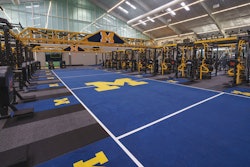The NCAA approved a policy Thursday that will change its revenue distribution model and reward Division I schools for their academic success.
The policy was approved by both the Division I Board of Directors and the NCAA Board of Governors and will begin in the 2019-20 academic year. The NCAA’s multimedia rights deal with CBS and Turner for the NCAA men’s basketball tournament, which was extended last April through 2032 for $8.8 billion, made the academics-based initiative possible.
“This landmark change benefits schools at which student-athletes succeed academically and graduate,” NCAA President Mark Emmert said in a statement. “The creation of an academic distribution unit underscores the NCAA’s commitment to putting its money where its mission is — with students. We’ve distributed funds to assist schools whose students need help in the classroom, but this is the first time revenue distribution will be determined by a school’s academic achievement. It’s an important moment for us as an association.”
Related: Knight Commission Pushes NCAA to Reward Academics
Under the NCAA’s current revenue distribution model, nearly 40 percent of the annual $550 million payout from the NCAA men’s basketball tournament is awarded based on the success of the teams in the tournament. For the first six years of the new policy, Division I schools will receive revenue from the NCAA tournament to distribute based on how their teams meet academic criteria. Schools with higher graduation rates and academic success can qualify for more funds, the Raleigh (N.C.) News & Observer reported.
In 2016-17, 62 percent of the distribution to Division I schools will go to student-athlete support and academic achievement. By 2024-25, the distribution increases to 76 percent, according to the NCAA. That means more than $10 million and eventually more than $100 million of the media revenues from the NCAA tournament will be awarded to Division I schools, according to the Knight Commission on Intercollegiate Athletics, which urged the NCAA to pass the policy.
“It’s especially gratifying, in my final months on the commission, to see the NCAA take this game-changing step to place a higher value on education in college athletics,” Brit Kirwan, chairman of the Knight Commission who is retiring at the end of the year, said in a statement. “It is critical to align the incentives in college sports with educational values.”
According to the NCAA, each school can earn one academic achievement unit per year if its student-athletes meet at least one of the following requirements:
- Earn an overall, single-year, all-sport academic progress rate of 985 or higher.
- Earn an overall all-sport graduation success rate of 90 percent or higher.
- Earn a federal graduation rate that is at least 13 percentage points higher than the federal graduation rate of the student body at that school.
Philip DiStefano, chancellor of the University of Colorado at Boulder who co-chaired the group that conceived the academic unit, discussed the change in the policy:
































